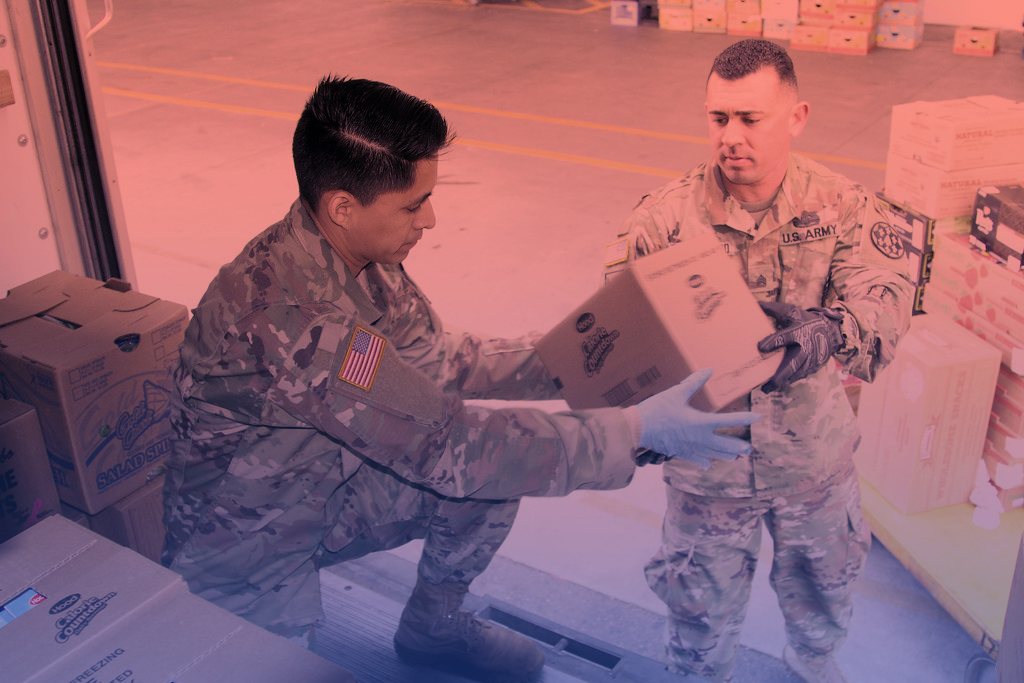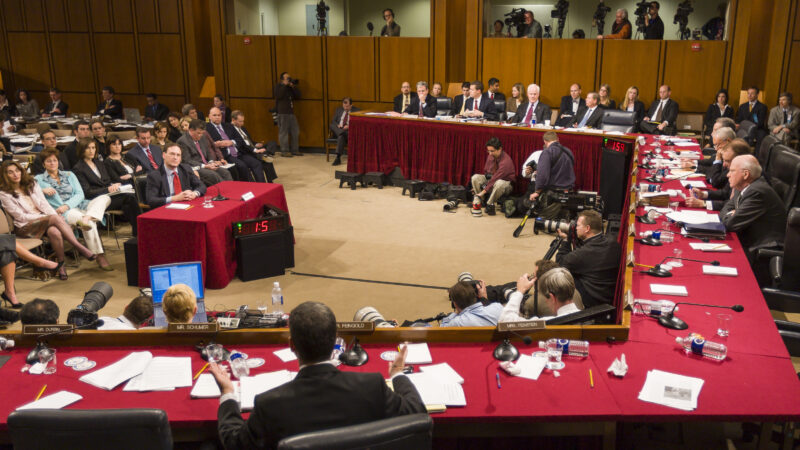Coalition Urges President Biden to Support National Guard Provisions in Annual Defense Authorization Bill (2021)
- September 21, 2022

Dear President Biden:
The undersigned organizations, from across the political spectrum and focusing on a wide range of issues, urge you to support crucial National Guard provisions in this year’s National Defense Authorization Act (NDAA) (H.R. 4350), as reported to the full House by the House Committee on Armed Services on September 10, 2021. These provisions are the District of Columbia National Guard Home Rule Act, included as Subtitle F; the amendment prohibiting private funding for interstate deployments of the National Guard, included as Section 503; and the amendment requiring the consent of the host jurisdiction for interstate National Guard deployments, included as Section 504.
Together, these legislative provisions will address critical flaws and loopholes in the existing laws governing the National Guard that were exposed by recent events, including the deployment of the National Guard in Washington, D.C. in June 2020 and the January 6 insurrection. Given the serious threats that these gaps and weaknesses have already shown to pose to the integrity of the National Guard as well as to Americans’ safety and constitutional rights, we call on you to strongly voice your support for the following proposals.
The D.C. National Guard Home Rule Act
The D.C. National Guard Home Rule Act would modernize the outdated and flawed command structure of the D.C. National Guard so that the chief executive of Washington, D.C. would have control while the D.C. Guard is in non-federalized status. As more than 20 civil society organizations wrote to Congress earlier this year, the D.C. National Guard Home Rule Act will help prevent future abuses of the presidential authority to deploy the military domestically while also improving the Guard’s responsiveness and preserving the president’s flexibility in a crisis.
In every other state and U.S. territory, the National Guard operates under local control unless and until it is called into federal service. In contrast, the D.C. Guard is always under presidential command—even when acting in supposedly non-federalized status. Not only is this outdated arrangement a relic from the era before D.C. had an elected local government, it undermines the foundational principle of “posse comitatus.”
The Posse Comitatus Act bars the use of federal military forces for domestic law enforcement except as expressly authorized by law. However, it applies to National Guard personnel only when they have been federalized. Despite the D.C. Guard being under permanent federal control, the Department of Justice has long endorsed the legal fiction that it can nonetheless operate in a non-
federal “militia” status. The combined result of D.C.’s outdated command structure and the Justice Department’s questionable legal interpretation is that the president can use the D.C. Guard as a domestic police force whenever he wishes, creating a huge gap in the Posse Comitatus Act’s coverage.
This permanent federal control over the D.C. Guard also hampers its flexibility and operational efficacy in a crisis, as was vividly demonstrated on January 6. When the attack on the Capitol began, the D.C. mayor had to ask the Department of Defense to deploy D.C. Guard personnel, rather than ordering them to respond herself. It took over an hour for the federal government to approve this request, and more than three hours before the authorization was communicated to the Guard itself.
Updating the command structure of the D.C. National Guard, so that the mayor controls it when it is serving in non-federal status, will fix both of these problems. The president would still be able to take command of the D.C. Guard when necessary by calling it into federal service, but the D.C. Guard will then be bound by the Posse Comitatus Act—just like all other federally-controlled military forces. Thus, the D.C. Guard will only be allowed to engage in domestic law enforcement as allowed by law. At the same time, the mayor will be able to use the Guard quickly and flexibly in an emergency.
Protecting Civilian Oversight and Protecting the National Guard From Political Exploitation Amendment (Section 503)
We also support the amendment by Representative Veronica Escobar (D-TX) to prohibit private financing of National Guard deployments across state lines. This provision contains an exception for interstate deployments responding to a natural disaster or emergency under section 401 of the Robert T. Stafford Disaster Relief and Emergency Assistance Act.
The proposal, which was adopted during committee markup by voice vote, was sparked by news this June that an out-of-state billionaire donor would be paying for the Governor of South Dakota to deploy her state’s National Guard troops to the southern U.S. border. Such private financing raises profound concerns as it erodes civilian oversight and democratically-accountable control of the military, as well as making the National Guard vulnerable to corruption, abuses of power, and exploitation for political gain. The Escobar amendment would help curb what amounts to a loophole that allows National Guard missions to be sold to the highest bidder, tailored to address interstate activities over which Congress holds clear jurisdictional authority.
The Consent for Interstate Deployment Amendment (Section 504)
Additionally, we support the amendment by Representative Mikie Sherrill (D-NJ) that will clarify that state governors may not deploy their National Guard units into other states or territories without those jurisdictions’ consent. This limitation against one state essentially mounting an armed invasion of another state is arguably inherent in the Constitution. However, last June, former U.S. Attorney General William Barr claimed that 32 U.S.C. § 502(f)—the law that permits
National Guard units to operate in so-called “hybrid status,” in which they may carry out federal missions but remain under state command and control—allows governors to deploy their Guard forces out of state even if the receiving state or territory objects.
This unprecedented interpretation of the law threatens basic principles of state sovereignty. If the president federalizes a state’s National Guard unit, he can of course send them wherever he deems necessary. If the Guard is operating under state command, however, there is no basis under our Constitution for one state’s governor to effectively invade another state with its militia.
Barr’s interpretation also undermines the Posse Comitatus Act. In hybrid status, Guard forces are exempt from the Act because they are under state command and control—a key element of which is the governor’s ability to decline a given federal mission. But if any governor can send their Guard forces into any other jurisdiction, then the right to refuse becomes meaningless. All the president needs is one willing governor in order to freely use that state’s National Guard as a domestic police force anywhere in the country. Last summer, President Trump found eleven.
***
There may be legitimate reasons for the president to deploy the military domestically, such as providing disaster relief, repelling invasions, or enforcing civil rights laws. Congress has given the president ample authority to deal with these situations, and none of the above reforms will prevent a president from lawfully exercising those powers. Instead, they will address dangerous gaps in the law to prevent the National Guard from being abused, misused, or dragged into partisan politics. We urge you to support the three amendments highlighted above and thank you for your consideration.
Sincerely,
American Civil Liberties Union
Brennan Center for Justice
Clean Elections Texas
DC Vote
Defending Rights & Dissent
Democracy 21
Franciscan Action Network
Government Accountability Project
Human Rights First
Pax Christi USA
People for the American Way
Project On Government Oversight Protect Democracy
R Street Institute
Secure Families Initiative
Stand Up America
Win Without War
Women’s Action for New Directions (WAND)
The Workers Circle
Related Content
Current United States Authoritarian Threat Index score: 3.3/5 Severe Threat •
-
Civil Liberties 3.4/5 • Severe Threat
-
Civil Violence 2.5/5 • Significant Threat
-
Executive Constraints 3.8/5 • Severe Threat
Join Us.
Building a stronger, more resilient democracy is possible, but we can’t do it alone. Become part of the fight today.
Donate
Sign Up for Updates Sign Up for Updates
Explore Careers Explore Careers
How to Protect Democracy How to Protect Democracy

